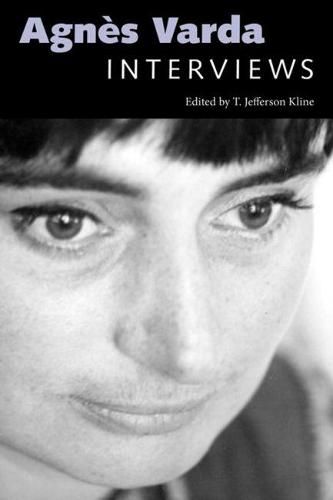Readings Newsletter
Become a Readings Member to make your shopping experience even easier.
Sign in or sign up for free!
You’re not far away from qualifying for FREE standard shipping within Australia
You’ve qualified for FREE standard shipping within Australia
The cart is loading…






This title is printed to order. This book may have been self-published. If so, we cannot guarantee the quality of the content. In the main most books will have gone through the editing process however some may not. We therefore suggest that you be aware of this before ordering this book. If in doubt check either the author or publisher’s details as we are unable to accept any returns unless they are faulty. Please contact us if you have any questions.
Over nearly sixty years, Agnes Varda (b. 1928) has given interviews that are revealing not only of her work, but of her remarkably ambiguous status. She has been called the
Mother of the New Wave
but suffered for many years for never having been completely accepted by the cinematic establishment in France. Varda’s first film, La Pointe Courte (1954), displayed many of the characteristics of the two later films that launched the New Wave, Truffaut’s 400 Blows and Godard’s Breathless. In a low-budget film, using (as yet) unknown actors and working entirely outside the prevailing studio system, Varda completely abandoned the
tradition of quality
that Truffaut was at that very time condemning in the pages of Cahiers du cinema. Her work, however, was not
discovered
until after Truffaut and Godard had broken onto the scene in 1959. Varda’s next film, Cleo from 5 to 7, attracted considerably more attention and was selected as France’s official entry for the Festival in Cannes. Ultimately, however, this film and her work for the next fifty years continued to be overshadowed by her more famous male friends, many of whom she mentored and advised.
Her films have finally earned recognition as deeply probing and fundamental to the growing awareness in France of women’s issues and the role of women in the cinema.
I’m not philosophical,
she says,
not metaphysical. Feelings are the ground on which people can be led to think about things. I try to show everything that happens in such a way and ask questions so as to leave the viewers free to make their own judgments.
The panoply of interviews here emphasize her core belief that
we never stop learning
and reveal the wealth of ways to answer her questions.
$9.00 standard shipping within Australia
FREE standard shipping within Australia for orders over $100.00
Express & International shipping calculated at checkout
This title is printed to order. This book may have been self-published. If so, we cannot guarantee the quality of the content. In the main most books will have gone through the editing process however some may not. We therefore suggest that you be aware of this before ordering this book. If in doubt check either the author or publisher’s details as we are unable to accept any returns unless they are faulty. Please contact us if you have any questions.
Over nearly sixty years, Agnes Varda (b. 1928) has given interviews that are revealing not only of her work, but of her remarkably ambiguous status. She has been called the
Mother of the New Wave
but suffered for many years for never having been completely accepted by the cinematic establishment in France. Varda’s first film, La Pointe Courte (1954), displayed many of the characteristics of the two later films that launched the New Wave, Truffaut’s 400 Blows and Godard’s Breathless. In a low-budget film, using (as yet) unknown actors and working entirely outside the prevailing studio system, Varda completely abandoned the
tradition of quality
that Truffaut was at that very time condemning in the pages of Cahiers du cinema. Her work, however, was not
discovered
until after Truffaut and Godard had broken onto the scene in 1959. Varda’s next film, Cleo from 5 to 7, attracted considerably more attention and was selected as France’s official entry for the Festival in Cannes. Ultimately, however, this film and her work for the next fifty years continued to be overshadowed by her more famous male friends, many of whom she mentored and advised.
Her films have finally earned recognition as deeply probing and fundamental to the growing awareness in France of women’s issues and the role of women in the cinema.
I’m not philosophical,
she says,
not metaphysical. Feelings are the ground on which people can be led to think about things. I try to show everything that happens in such a way and ask questions so as to leave the viewers free to make their own judgments.
The panoply of interviews here emphasize her core belief that
we never stop learning
and reveal the wealth of ways to answer her questions.